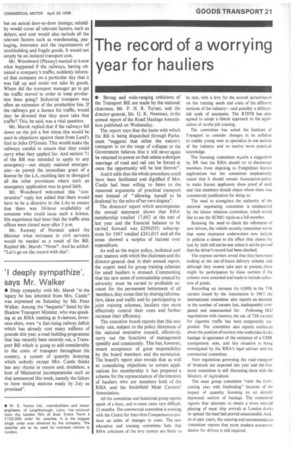The record of a worrying year for hauliers
Page 23

If you've noticed an error in this article please click here to report it so we can fix it.
• Strong and wide-ranging criticisms of the Transport Bill are made by the national chairman, Mr. P. H. R. Turner, and the director-general, Mr. G. K. Newman, in the annual report of the Road Haulage Association published on Wednesday.
The report says that the haste with which the Bill is being dispatched through Parliament "suggests that either the nation's transport is on the verge of collapse or the Government believes that it will never again be returned to power so that unless a shotgun marriage of road and rail can be forced at once the opportunity will be lost forever".
And it adds that the whole procedure could have been facilitated and dignified if Mrs. Castle had been willing to listen to the reasoned arguments of practical transport men instead of "allowing herself to be deafened by the echo of her own dogma".
The directors' report which accompanies the annual statement shows that RHA membership totalled 17,692 at the end of last year and the financial balance to be carried forward was £290,055; subscriptions for 1967 totalled £241,015 and all the areas showed a surplus of income over expenditure.
As well as the major policy, technical and cost matters with which the chairman and the director-general deal in their annual report, the urgent need for group training schemes for small hauliers is stressed. Commenting that the new sense of comradeship created by adversity must be turned to profitable account for the permanent betterment of all members, they stress that by sharing information, ideas and traffic and by participating in joint training schemes, hauliers can more effectively control their costs and further increase their efficiency.
The executive board reports that this new body can, subject to the policy directions of the national executive council, effectively carry out the functions of management speedily and consistently. This has, however, meant acceptance of great responsibility by the board members and the secretariat. The board's report also reveals that as well as considering objections to certain applications for membership it has prepared a scheme for the representation of the interests of hauliers who are members both of the RHA and the Smithfield Meat Carriers' Association.
Al] the committee and functional group reports speak of a busy, and in some cases very difficult, 12 months. The commercial committee is working with the Centre for Inter-firm Comparison to produce an index of changes in costs. The new education and training committee feels that RHA criticisms of the levy system are likely to be met, with a levy for the second period based on the training needs and costs of the different sections of the industry—and possibly a differential scale of payments. The RTITB has also agreed to adopt a liberal approach to the application of on-the-job training.
The committee has asked the Institute of Transport to consider changes in its syllabus to enable young men to specialize in one section of the industry and to receive more practical knowledge.
The licensing committee reports a suggestion by BR that the RHA should try to discourage members from objecting to Freightliner licence applications but the committee emphatically stated that it should remain Association policy to make licence applicants show proof of need and that members should object where there was commercial justification for doing so.
The need to strengthen the authority of the national negotiating committee is emphasized by the labour relations committee, which would like to see the SCMU rejoin as a full member.
Stressing the need to check the references of new drivers, the vehicle security committee warns that some insurance underwriters now include in policies a clause to the effect that claims for loss by theft will not be met unless it can be proved that the driver's record had been checked.
The express carriers reveal that they have been looking at the out-of-hours delivery scheme and although they cannot take part at present, there might be participation by these carriers if the scheme were extended and made to include collection of goods.
Recording an increase (to 6,000) in the TIR carnets issued by the Association in 1967, the international committee also reports an increase in the number of carnets lost, inadequately completed and unaccounted for. Following TRU negotiations with insurers, the use of TIR carnets for cigarette traffic has been temporarily suspended. The committee also reports confusion about the position of carriers who undertake docks haulage in ignorance of the existence of a CMR consignment note, and this situation is being investigated by the RHA's legal adviser and the commercial committee.
New regulations governing the road transport of livestock are expected this year and the livestock committee is still discussing these with the Ministry of Agriculture.
The meat group committee "view the forthcoming year with foreboding" because of the impact of quantity licensing on an already depressed section of haulage. The committee reports that attempts to obtain a more rational phasing of meat ship arrivals at London docks to spread the load had proved unsuccessful. And, as in past years, the catering and accommodation committee reports that more modern accommodation for drivers is still required.




















































































































